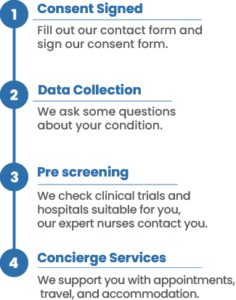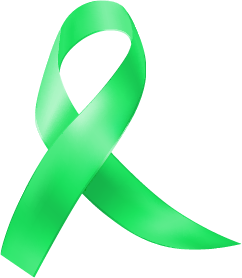News
Massive Bio Has Onboarded Over 120,000 Cancer Patients to Find Their Clinical Trial
Discover the Latest Follicular Lymphoma Treatments!
Are you a patient diagnosed with Follicular Lymphoma seeking innovative treatment options? Massive Bio have good news for Follicular lymphoma patients and can help you access the latest therapies with no-cost clinical trial matching.
Compliant with

You can receive a guidebook with information about lymphoma by filling out the form.
Follicular Lymphoma Treatments
Massive Bio’s advanced Artificial Intelligence system will match and suggest a range of potential follicular lymphoma treatments tailored to your unique medical situation. Our Patient Relations Coordinators will evaluate your submission and promptly reach out to discuss your eligibility for our follicular lymphoma clinical trials.
What is Follicular Lymphoma?
Diagnosis:
Before considering clinical trials, it is important to understand the disease. Follicular lymphoma (FL) is a type of non-Hodgkin lymphoma (NHL), accounting for 30% of all lymphomas. It originates in the B-lymphocytes, a type of white blood cell. Slow growth characterizes it, and it can often be asymptomatic for a long period.
Which are the most common Follicular Lymphoma symptoms?
The symptoms of Follicular Lymphoma you should be aware of are the following:
- Painless swelling of lymph nodes in the neck, armpit, or groin.
- Fatigue: Persistent tiredness or weakness.
- Fever: Unexplained and recurring fevers considered a B symptom.
- Night Sweats: Profuse sweating during the night, considered a B symptom.
- Weight Loss: Unintentional loss of more than 10% of body weight over six months, considered a B symptom.
- Abdominal Pain or Fullness: Often due to an enlarged spleen or lymph nodes.
B symptoms refer to systemic symptoms of fever, night sweats, and weight loss that can indicate a more aggressive disease course and are used in staging and prognosis of lymphomas.
Grades of Follicular Lymphoma:
Follicular lymphoma cancer is graded based on the number of large cells, called centroblasts, observed under a microscope:
- Grade 1-2: Few centroblasts; generally slower growing.
- Grade 3A: More centroblasts but still shows a follicular pattern.
- Grade 3B: High number of centroblasts, usually considered more aggressive and may be treated like diffuse large B-cell lymphoma (DLBCL).
Grade 3B, mostly known as diffuse large B-cell lymphoma (DLBCL) or undergoing transformation to a high-grade lymphoma, is typically excluded from clinical trials of Follicular Lymphoma and instead considered for DLBCL trials. This ensures appropriate treatment strategies and trial relevance for different lymphoma behaviors.
Staging Follicular Lymphoma
- Stage I Follicular Lymphoma: Involvement of a single lymph node region or a single extra lymphatic organ.
- Stage II Follicular Lymphoma: Involvement of two or more lymph node regions on the same side of the diaphragm or localized involvement of an extra lymphatic organ and its regional lymph nodes.
- Stage II Bulky: Stage II with one or more lymph nodes measuring 6 cm or larger.
- Stage III Follicular Lymphoma: Involvement of lymph node regions on both sides of the diaphragm, which may also be accompanied by localized involvement of an extra lymphatic organ.
- Stage IV Follicular Lymphoma: Disseminated involvement of one or more extra lymphatic organs with or without lymph node involvement.
Treated vs. Untreated Follicular Lymphoma
- Untreated Follicular Lymphoma: Often managed with a “watch and wait” approach, especially if asymptomatic or slow-growing.
- Treated Follicular Lymphoma: Therapy may include chemotherapy, targeted therapy, radiation, and immunotherapy. The treatment approach depends on the stage, grade, and symptoms.
We have an incredible opportunity for you to access new therapies that can revolutionize your journey with Follicular Lymphoma, a type of non-Hodgkin’s lymphoma. Clinical trials are open to individuals with a Follicular Lymphoma diagnosis, regardless of their treatment status, providing an opportunity for both newly diagnosed patients who haven’t started treatment and those who have undergone previous therapies.
What are the treatment options for
Follicular Lymphoma?
Chemotherapy: Drugs that kill or slow the growth of rapidly dividing cells. Effective for broad cancer cell destruction, often used as a standard initial treatment.
Targeted Therapy: Drugs designed to target specific molecules involved in cancer cell growth and survival.
- Anti-CD20: Antibodies that target the CD20 antigen on B-cells, leading to their destruction. Used in nearly all treatment regimens for follicular lymphoma.
- Immunomodulatory Drugs: Agents that modulate the immune system to enhance anti-tumor effects.
- BTK Inhibitors: Block Bruton’s tyrosine kinase, disrupting B-cell receptor signaling and inducing cancer cell death.
- EZH2 Inhibitors: Inhibit EZH2, an enzyme promoting cancer cell proliferation in cases with specific mutations.
Radiation Therapy: Uses high-energy rays to kill cancer cells, typically used for localized disease.
Immunotherapy: Enhances the body’s immune response to cancer.
- CAR T-cell Therapy: Genetically modified T-cells designed to attack cancer cells.
- Stem Cell Transplant replaces sick bone marrow with healthy stem cells, often used for relapsed or refractory Follicular Lymphoma.
Clinical trials aim to develop new drugs, treatment strategies, and combinations for follicular lymphoma to enhance patient outcomes, improve quality of life, and discover innovative therapies.
Genetic Testing on Follicular Lymphoma
Immunohistochemistry (IHC): is a laboratory technique used to detect specific antigens (proteins) in cells within tissue sections using antibodies. The following biomarkers are crucial in the treatment of follicular lymphoma (FL) as they help in diagnosing the disease, predicting treatment response, and personalizing therapy:
- CD20: A protein expressed on the surface of B-cells; almost universally present in FL.
- CD10: A marker of germinal center B-cells, expressed in approximately 60-70% of FL cases.
- BCL2: Overexpressed due to t(14;18) translocation, present in about 85% of FL cases.
- BCL6: A marker of germinal center B-cells, involved in cell differentiation and proliferation.
Next-Generation Sequencing (NGS): Is a method used to analyze genetic mutations, providing detailed information about genetic alterations. The most common biomarkers are:
- BCL2: Mutation and translocation t(14;18) found in approximately 85% of cases.
- EZH2: Mutations found in around 20% of FL cases, associated with better prognosis.
- CREBBP: Mutations present in about 60% of FL cases.
Fluorescence In Situ Hybridization (FISH): This lab technique uses glowing probes to highlight specific parts of DNA on chromosomes. It is especially important in follicular lymphoma because it can detect key genetic changes, like the t(14;18) translocation, which causes an overproduction of the BCL2 protein and helps cancer cells survive.
The Role of Follicular Lymphoma
Clinical Trials
Innovative Therapy: Our cutting-edge therapy brings together the latest advancements in medical science and technology to target your follicular B-cell lymphoma with precision and effectiveness.
Personalized Match: We understand that every patient is unique, and that’s why we focus on matching you with a treatment plan that aligns with your specific requirements and medical history, whether you’re dealing with indolent follicular lymphoma, untreated follicular lymphoma, refractory follicular lymphoma, or recurrent follicular lymphoma.
Expert Guidance: Throughout your journey, even with low-grade lymphoma, our experienced team of medical professionals will be by your side, providing guidance, support, and answering any questions you may have.
By signing up for our matching program, you’re taking an active role in exploring new possibilities and gaining access to innovative therapy that can potentially transform your life. Don’t miss out on this opportunity to enhance your Follicular Lymphoma treatment.
Join us today and let’s embark on this extraordinary path towards improved health together!
We combine the power of technology with our dedicated team of medical providers to find you the best treatment options available.
Access the free matching toolHow Massive Bio Helps Patients With Follicular Lymphoma


Massive Bio offers a quick, easy, and FREE way to find clinical trials for patients like you. With our unique clinical trial matching system and compassionate team, Massive Bio can rapidly match you to a clinical trial of a new follicular lymphoma treatment.
Talk to us. Our nurses and patient relations coordinators are here and happy to help you. You are not alone in this fight.
Call +1 844 627 7246What is a Follicular Lymphoma clinical trial?
Clinical trials test the latest scientific advancements in Follicular Lymphoma treatment. Patients who choose to enroll in trials can receive cutting-edge treatment and high-quality care under the direction of scientists, doctors, and researchers. Follicular Lymphoma patients might gain access to promising drugs and innovative treatments long before they're made available to the public.

You are not alone
You can have an experienced team with you
What Are Clinical Trials?
Cancer is an unfortunate reality that touches most of us at some point in our lives. If you or a loved one has cancer, you may have heard or read that clinical trials could offer access to innovative new treatments. But what exactly is a clinical trial? In this video, Massive Bio co-founder Arturo Loaiza-Bonilla, MD, explains how clinical trials work, what to expect if you enroll in one, and why a clinical trial can be an important treatment option for many cancer patients.
We dream of the day when cancer disappears from our lives. Massive Bio is working tirelessly to achieve that goal.
-
Why should I trust Massive Bio?
Why should I trust Massive Bio?
Massive Bio has provided health to more than 120,000 cancer patients in 25 countries across three continents. It collaborates with over 80 global partners. In 2022, Massive Bio became part of the Precision Cancer Consortium (PCC), alongside major companies such as AstraZeneca, Bayer, Eli Lilly & Company, GSK, Johnson & Johnson/Janssen, Novartis and Roche.
-
What is the process?
What is the process?
To find the best clinical research studies for you, we need your medical history and consent. You can provide this consent by filling out the form on this page and the following pages. Once you’ve done that, our patient relations coordinator will contact you to discuss the details and provide further information for clinical research matching report.
-
Why do I have to provide my medical records to enroll in a clinical trial?
Why do I have to provide my medical records to enroll in a clinical trial?
To enroll in clinical trial, you must meet highly specific criteria that’s established by the researchers who are conducting the investigation. That includes detailed information about type of cancer, treatment history, response to treatment, and other data that is collected in medical records.
-
What should I do if I don’t have my medical records?
What should I do if I don’t have my medical records?
If you are being treated for cancer or any other disease, your doctor should have a complete record of your medical care, including specific information about what form of the disease you have and what treatments you have received. Your patient relations coordinator will contact you and inform you about the details.
-
What are the costs associated with Massive Bio’s services?
What are the costs associated with Massive Bio’s services?
Massive Bio provides its services to the patients and their doctors at no cost—you won’t have to pay anything to receive a clinical-research matching report. There are no hidden costs involved.
-
How does Massive Bio protect my personal information?
How does Massive Bio protect my personal information?
Massive Bio strictly adheres to all HIPAA guidelines and international regulations focused on maintaining your privacy. We take extra measures to secure your personal information, ensuring it is protected beyond the mandatory requirements.
-
Where can I find clinical research studies in my area?
Where can I find clinical research studies in my area?
Your doctor may know of a clinical research study being conducted in your area that’s recruiting participants and is right for you. However, Massive Bio uses its artificial intelligence-powered platform to match patients to clinical research studies of treatments that give you the best chance of a positive outcome and are being conducted in a geographical location that makes sense for you.
-
Can I continue seeing my doctor or oncologist while also taking services of Massive Bio?
Can I continue seeing my doctor or oncologist while also taking services of Massive Bio?
Yes, Massive Bio keeps your doctor up to date on your status throughout your participation.






